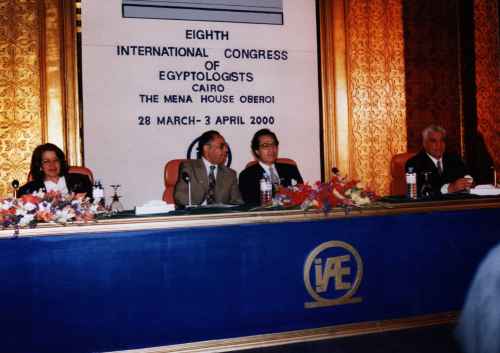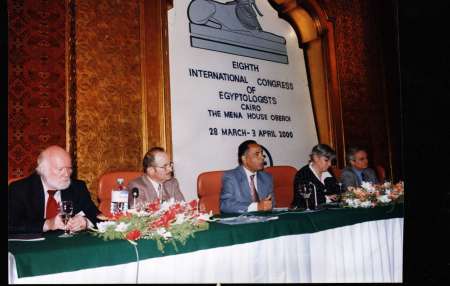
Dr. Fayza Heikal, Dr.Gaballah, Farouk Hosni, and Dr. Zahi Hawass
The Eighth International Congress Of Egyptology

Dr. Fayza Heikal, Dr.Gaballah, Farouk Hosni,
and Dr. Zahi Hawass
As head of the SCA, the Minister requested to stop excavations in Upper Egypt and concentrate over the Delta area in order to preserve the remains in Lower Egypt and trace more historical events related to that part of Egypt. Request confirmed by both Dr. Gaballah and Zahi Hawass, while Dr. Heikal focused on the importance of scientific publication. Mr. Hosni had announced that Missions and working teams acting over the Egyptian soil are 100 International Team. He also pointed to the Government plan of constructing more Museums to cover every province in Egypt. 10 Museums were erected according to the pre-mentioned plan with still 54 more to be built. The new Egyptian Museum is projected over an area extending near the Giza Plateau.
Scientific Debates
Scientific Debates were attended by many as major topics interested a variety of
attendants who were perseverant.
The major subjects:
1- Egyptian Archaeology
2- Site Management
3- Religion
4- Language
5- Literature
6- Museology
7- Art
Egyptian Archaeology
O'Connor. Respondent M.Bietak. Panel F. Hassan, K. Mysliewiec, R. Stadelmann, and M. Verner.
Facing new technologies, the human element is most important re Archaeology. The new century is facing an increase in excavations parallel to a specific development in aims. A main concern raised out of this new situation Maintenance and Site Management to guarantee the safety of the monuments and sites. The fact that SCA, Egyptian Universities and Foreign Missions acting in Egypt are raising well-trained new generations is to be appreciated. Methodology and Archaeology purposes should be focused on through Egyptian Scientific Institutes, SCA and Egyptian Specialized Universities to lead to scientific researches and excavations. Discussions raised main axis of interest to mention surveys, mapping projects, documentation and the importance of documentation's renewal in SCA. Education has an important role noticeable on the long run: to raise future generations on a high cultural and educational level well trained in specific domains as excavations according to appropriate methodology. The raise of such generations needs the experience of elder people.
Site Management
Debate Zahi Hawass. Respondent: K. Weeks. Panel: M. Jones, C.Leblanc, W. Mayer, and F. Saleh.
Site Management is an urgent need to preserve Egyptian Cultural Heritage as tourists' misuse, constant excavations and inhabitants spread near archaeological sites are a great threat. A plan has to be set and a specific methodology observed in order to save and preserve the sites. Excavations have to stop in Upper Egypt for at least ten years and directed to the Delta.
Religion
H. Te Velde. Respondent J. Assman. Panel J. Allen, Frandsen, Goyon and E. Winter.
It was unanimously recognized that our knowledge of Egyptian Religion is little and needs more concentration, this despite the writings of many scholars in the subject. Joined efforts of archaeologists, chronologists, anthropologists, language specialists, art, literature… all domains related to. The Ancient Religion purpose was to reach the MAAT through the human element so a clear distinction between truth and untruth, right and wrong have to be clearly defined.
Language
Loprieno. Respondent: Satzinger. Panel Johnson, Yunge, Ray and Vernus.
Language and its applications have been reviewed through texts. Progress in this field is on especially during the latest fifteen years. The dramatic impact of recent developments in areas of linguistic research conceptually distant from syntax is also considered.
Literature
Baines. Respondent: Kelly Simpson. Panel: Fayza Heikal, Jasnow, B.Mathieu, and Roccati.
Texts in and out literature context go beyond time and place limits. Definitions are elements to make studies reachable and literature is not a completely autonomous cultural domain. Some texts are considered as Fantasy, others documentary while specific texts like Senuhy tale and Wenamun are considered as complex fictions. Researches on literature have centered on Middle Kingdom corpus and no other literature had the same interest. Texts are a positive development.
Reading and interpreting the text is of great importance that should be encouraged with focus on the main theme, the social personality dealt with and the social structure and context. These texts should never be considered as a historical source of events. Importance has only to be given to the social structure and social attitudes.
Museology
Schulz. Respondent: Aly Radwan. Panel Donadoni, Ziegler, Arnold and Mohamed Saleh.
The main objective of a museum is the preservation and conservation of historical monuments. The museum is also a scientific institute that was lately universally considered of great importance. This growing interest require more funds to maintain museums standard of development. Exhibitions in and out the country became a necessity to provide a growing needed income, which created new and urgent problems. New strategies have to be observed as well as new legislation is required to safeguard the monuments exhibited or sent out. Illicit traffic is to be strictly forbidden. Monuments' traffic is to be pursued and pieces sent back home. CDs, photos, albums…etc will guarantee a good income to Museums. On the other hand another opinion claims the importance of museums for science and scholars setting aside the commercial side.
Art
Rothman. Respondent: Sourousian. Panel Kraus, Muller and Cyber.
Studying art faces the lack of methodology in teaching art or artistic work. The only sources being Museums' catalogues, the Catalogue Général of the Egyptian Museum is an important reference of artistic pieces. More monuments are to be documented according to a general terminology to be observed while referring to monuments or as an artistic terminology.
History
Combined efforts between chronologists, archaeologists, inscriptions interpreter, critics…etc. are needed in rewriting history to reach a real history relating Events of Ancient Egyptian Life and Civilization. Previous writings in this respect were only catalogues viewing only history and not the Real involved persons related to History.

Written by:
Naglaa El Zahlawi